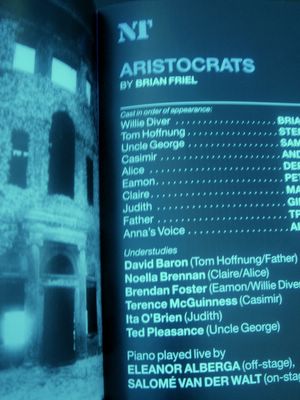' A Party in Vienna! ' ...

www.nationaltheatre.org.uk

This blogger of yours is happy to report to the Honourable Reader that in the recent and recently alluded week-end in terror-free London a further slot of theatrical entertainment was managed to be included. I refer to Mr Brian Friel's 1969 play "Aristocrats" at the Lyttelton, part of the irredeemably ugly South Bank Center, where the National Theater has its headquarters. Miss Boots was in attendance.
"Aristocrats" is set in Summer, mid-70's, at Ballybeg Hall, the home of District Justice O'Donnell, a large and decaying house overlooking the village of Ballybeg, County Donegal, Ireland. The play is the traditional Doom of the Gods' stuff ( the Wagnerians amongst us might care to fastidiously use the 'Gotterdammerung' word instead). About the once brilliant grandee family who now finds himself on its own, no real possible social "compagnons de route" in sight. But it has a twist, though. The big house is not part of the Archipelago of Ascendancy, I mean the "By Appointment" world of Anglo-Irish Protestant large estates, but belongs instead to a doubly pariah lot, the Rome-oriented Catholic Aristocracy. (I must declare a personal interest here. I had for years the task of being a sort of "Northern Ireland Question" desk officer at the Chancery supporting my country's Ambassador to the Court of St James's. And it is indeed ironic to be writing about these faded memories on the day the Provisional Irish Republican Army has apparently taken the extra step in replacing the bullet for the ballot box.)
One of the characters on the play, Tom Hoffnung, is a scholar retrieving bits and pieces of the Ballybeg Hall saga. As he explains at some point:
(TOM) " Well, when we talk about the big house in this country, we usually mean the Protestant big house in this country, we usually mean the Protestant big house with its Anglo-Irish tradition and culture; and the distinction is properly made between that tradition and culture and what we might call the native Irish tradition and culture which is Roman Catholic. " (...) "So what I'm researching is the life and the lifestyle of the Roman Catholic big house - by no means as thick on the ground but still there; what we might call a Roman Catholic aristocracy - for want of a better term. (...) And the task I've set myself is to explore its political, cultural and economic influence both on the ascendancy ruling class and on the native peasant tradition. Over the last one hundred and fifty years - in fact since Catholic Emancipation. (...) ".
I don't want to bother too much the Honourable Reader with the intricacies of the Irish Question, however passionate it might be. What I really want to share with those unfortunates who were not able to attend the performance at the National is the 'party in Vienna' concept.
Andrew Scott playing Casimir, the younger son of the doomed family, has THE moment of the play, eyes shinning, arms strangely twisted and fingers stretched, with the following lines:
(CASIMIR ) " Great-grandfather then O'Donnell then. Yes, you're right: he lived in Europe for six months one time to escape the fever that followed the famine here. A party in Vienna. The expression became part of the family language: anything great and romantic and exciting that had happened in the past or might happen in the future, we called it 'a party in Vienna' - Yes. Very beautiful, isn't it? And there was another detail about that party: Chopin was playing that sonata and Balzac began to sing it and Grandfather told Balzac to shut up and Chopin said, "Bravo, Irishman! Bravo!" Grandfather, of course, was thrilled. Insn't it beautiful (...) "
And I would unashamedly repeat it myself: Isn'it beautiful?
Now, one would like to ask, with arms and fingers stretched and wet sparkling eyes: haven't we had ourselves, in our respective tormented love lives, a 'party in Vienna!' ?
No comments:
Post a Comment